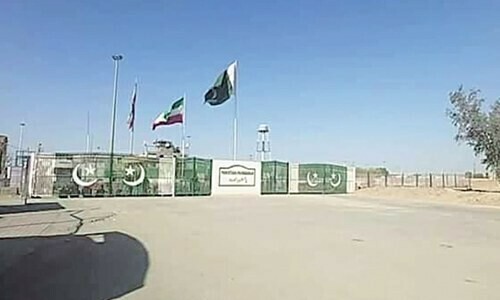Iranian Foreign Minister Hossein Amir Abdollahian on Monday said there was “no doubt” that militants located in the border areas of Pakistan and Iran were “led and supported by third countries”.
“There is no doubt that the terrorists located in the common border regions and areas of Iran and Pakistan are led and supported by third countries and they never favour any good action in line with the benefits of the Iranian and Pakistani governments and nations,” the Iranian foreign minister said.
He made the remarks while addressing a joint press conference alongside interim Foreign Minister Jalil Abbas Jilani in Islamabad. Abdollahian had arrived in Pakistan earlier today, following which he and FM Jilani discussed bilateral cooperation between the two countries.
According to the Foreign Office (FO), the two had “underscored the importance of robust dialogue and cooperation as the pathway for a positive, forward-oriented and upward trajectory in bilateral relations”.
“The two sides agreed to work towards promoting the mutually desired goals of peace and prosperity, based on mutual respect and a collective approach to address common challenges,” it added.
The remarks by the Iranian official come days after tensions escalated between the neighbours following a deadly Iranian air strike in Pakistan, leading Islamabad to strike terrorist hideouts in the neighbouring country’s Sistan-Baluchestan province.
Moreover, on Saturday nine Pakistani workers were gunned down by unidentified attackers in Sistan-Baluchestan. Pakistan has demanded a comprehensive investigation and swift prosecution of those responsible for the brutal attack.
At the outset of his speech, the Iranian minister highlighted that both countries “never had territorial differences”.
“Our historical bilateral relations and connections testify that we are a single nation located in two different geographical positions,” he said.
He said he had received Islamabad’s invitation for Iranian President Ebrahim Raisi to visit Pakistan.
The minister stated that both Iran and Pakistan respected each other’s sovereignty and territorial integrity.
“We are here, so in a loud voice we will tell all terrorists that Iran and Pakistan will not provide them with any opportunity to endanger our common security,” Abdollahian asserted.
He added that both sides had agreed to take “further actions as soon as possible when it comes to border security [and] necessity of fighting against terrorism”, as well as expansion of trade, commercial and economic cooperation.
High-level mechanism to be established
In his remarks, FM Jilani said that during the meeting between him and his Iranian counterpart, both sides had agreed to “establish a high-level constructive mechanism at the level of foreign ministers of the two countries”.
He added that the mechanism would “meet alternatively in both Iran and Pakistan on a regular basis to oversee the progress that is being made in various areas of cooperation”.
The foreign minister further said both neighbours agreed to “cooperate to fight terrorism in our respective areas”, emphasising the need to “allay and address each other’s concerns”.
“We have agreed to station liaison officers of which an agreement was already in place at the earliest date,” Jilani said, specifying that they would be deployed in Turbat and Zahedan.
He went on to say that the border markets that had been established, would be operationalised at the earliest.
FM Jilani highlighted that his Iranian counterpart’s visit at “such short notice testified to the deep commitment on both sides to solidify ties” with each other.
He said that close ties between Pakistan and Iran were “not only beneficial for development but an important source of stability for the people”.
Subsequently, both countries resolved to expand cooperation, especially in the political domain, the foreign minister said.
Emphasising that the threat of terrorism posed a common challenge to both countries, Jilani said Islamabad and Tehran had agreed to “adopt collaborative approaches to confront this menace to leverage the robust institutional mechanism”.
“Respect for sovereignty and integrity remains the foundational step for cooperation,” he stressed.
On the occasion, the ministers also agreed to prioritise uplift and development projects, terming the joint inauguration of the border and Hub-Bolan electricity line a testament to the same.
COAS stresses need to respect state sovereignty
Meanwhile, a statement from the military’s media wing said Chief of Army Staff (COAS) General Asim Munir in his meeting with FM Abdollahian “underscored the centrality of respecting the other state’s sovereignty and territorial integrity, calling it sacrosanct, inviolable and the most important cardinal of state-to-state relationship”.
According to the Inter Services Public Relations (ISPR), the two sides said that terrorism was a common threat that needed to be tackled through collaborative efforts, better coordination and intelligence sharing.

The COAS emphasised the need for “sustained engagement” and utilising available communication channels to address security concerns.
“Both sides agreed to operationalise the mechanism of deployment of military liaison officers in each other’s country at an early date to improve coordination and efficiency of response against common threats.”
The ISPR further said both sides reaffirmed the resolve to “remain closely engaged and not allow any spoilers to drive a wedge” between the two nations.
“Pakistan and Iran are fraternal neighbours and the destiny of both nations are intertwined. Both sides reiterated their commitment to peace, stability and prosperity in the border region which was identified as an indispensable requirement for the well-being of people living on both sides.”
The ISPR added that both sides emphasised strengthening bilateral ties and fostering a greater understanding of each other’s concerns due to the historical, religious and cultural ties binding Pakistan and Iran.
The Iranian FM also met caretaker Prime Minister Anwaarul Haq Kakar who reaffirmed Pakistan’s commitment to further consolidate bilateral ties.
PM Kakar emphasised the need to address common challenges through collaborative and cooperative approaches, rooted in the respect for international law and the principles of the UN Charter, in particular, the territorial integrity and sovereignty of both Pakistan and Iran, said a statement from the Prime Minister’s Office.
“The prime minister conveyed his warm sentiments for President Ebrahim Raisi and extended an invitation to President Raisi to visit Pakistan at his earliest convenience.”
Iranian FM arrives in Islamabad
Abdollahian was received at the Nur Khan airbase by Additional Foreign Secretary (Afghanistan and West Asia) Rahim Hayat upon his arrival in Pakistan. The FO said that the Iranian official would hold “in-depth talks” with FM Jilani and also call on caretaker Prime Minister Anwaarul Haq Kakar during his visit.
Later, the FO shared photos of Abdollahian being welcomed at the Ministry of Foreign Affairs by FM Jilani.
Tit-for-tat strikes
On January 16, Iran had launched attacks in Pakistan targeting what it described as bases for the militant group Jaish al-Adl in the border town of Panjgur in Balochistan, Iranian state media had reported, prompting strong condemnation from Islamabad and downgrading of diplomatic ties.
Later, Pakistan struck “hideouts used by terrorist organisations namely Balochistan Liberation Army (BLA) and Balochistan Liberation Front (BLF)” in Iran’s Sistan-Baluchestan province, in an intelligence-based operation codenamed “Marg Bar Sarmachar”.
Iran’s IRNA news agency had reported that nine people were killed in the attack targeting a village in the city of Saravan, with Iranian Interior Minister Ahmad Vahidi saying all the dead “were foreign nationals”. Iran had condemned strikes and summoned Pakistan’s charge d’affaires “to protest and request an explanation from the Pakistani government”.
In Islamabad, the escalation had prompted a high-level meeting of Pakistan’s premier authority on security and foreign policy, the National Security Committee. It was chaired by caretaker Prime Minister Anwaarul Haq Kakar with cabinet members, the chairman of the Joint Chiefs of Staff Committee, the chiefs of the Army, Navy and Air Staff, and other heads of intelligence in attendance.
During the hours-long meeting, the NSC had ratified the move towards reducing tensions between Pakistan and Iran and underscored a commitment to addressing mutual security concerns.
“The forum (NSC) expressed that Iran is a neighbourly and brotherly Muslim country, and existing multiple communication channels between the two countries should be mutually utilised to address each other’s security concerns in the larger interest of regional peace and stability,” a statement issued by the prime minister’s office after the meeting said.
The NSC hoped that both countries “would mutually be able to overcome minor irritants through dialogue and diplomacy and pave the way to further deepen their historic relations” but at the same time emphasised that any violation, under any pretext, would be met with the state’s full force.
That sentiment was reciprocated by Tehran, whose foreign ministry, in a statement later that day, had said Iran “adheres to the policy of good neighbourliness and brotherhood between the two nations and the two governments”.
These exchanges had subsequently set the stage for a phone conversation between FM Jilani and his Iranian counterpart.
The two foreign ministers had underscored the importance of collaboration and synchronising efforts at the operational level, with a specific focus on counterterrorism and other mutual concerns. They also committed to de-escalating tensions.
Furthermore, the foreign ministers had deliberated on the reappointment of each country’s ambassadors to their respective capitals, signalling a move towards restoring diplomatic normalcy.
Jilani had also invited Amirabdollahian to visit Islamabad. The Iranian foreign minister, according to the Iranian side, had emphasised that the assurances about security and military cooperation should be seriously pursued.
On Friday, the FO spokesperson said that envoys of Pakistan and Iran had arrived at their respective embassies in Islamabad and Tehran “as per understanding between the two countries”.
9 Pakistanis shot dead
However, as the two countries sought to ease tensions, nine Pakistani workers were gunned down by unidentified attackers in Iran’s Sistan-Baluchestan province near the border with Pakistan.
Iran’s Mehr news agency reported that “according to witnesses, this morning unknown armed men killed nine non-Iranians in a house in the Sirkan neighbourhood of Saravan city” in Sistan-Baluchestan province.
The individuals who lost their lives in the incident were from Punjab, specifically originating from Multan, Muzaffargarh and Bahawalpur districts.
The province’s deputy governor, Alireza Marhamati, told the official IRNA news agency that according to survivors of the incident, “three armed people shot at the foreigners after entering their residence and fled the scene”.
Shortly after, the FO had said it was in touch with Iranian authorities and had “underscored the need to immediately investigate the incident and hold to account those involved in this heinous crime”.
Pakistan’s Ambassador to Iran Mudassir Tipu said on Sunday that two Pakistanis injured in the attack would be discharged soon from the hospital. The statement came as the protesting families of the victims of the gun attack staged a demonstration outside the assistant commissioner’s office in Alipur tehsil of Muzaffargarh district.
Additional reporting by Iftikhar Shirazi.
















































Dear visitor, the comments section is undergoing an overhaul and will return soon.